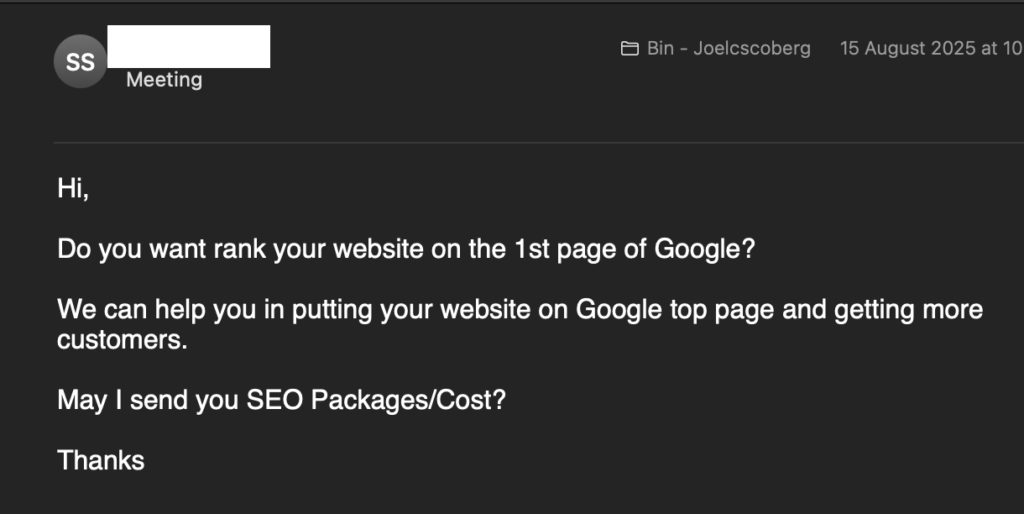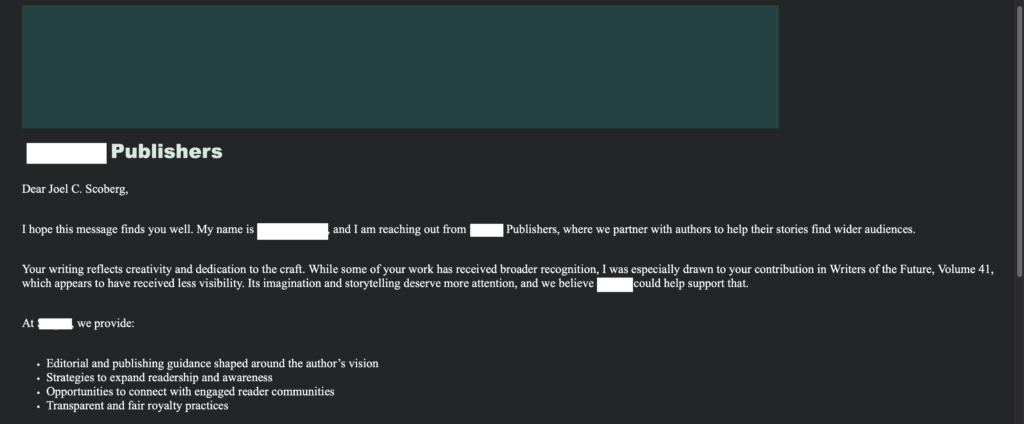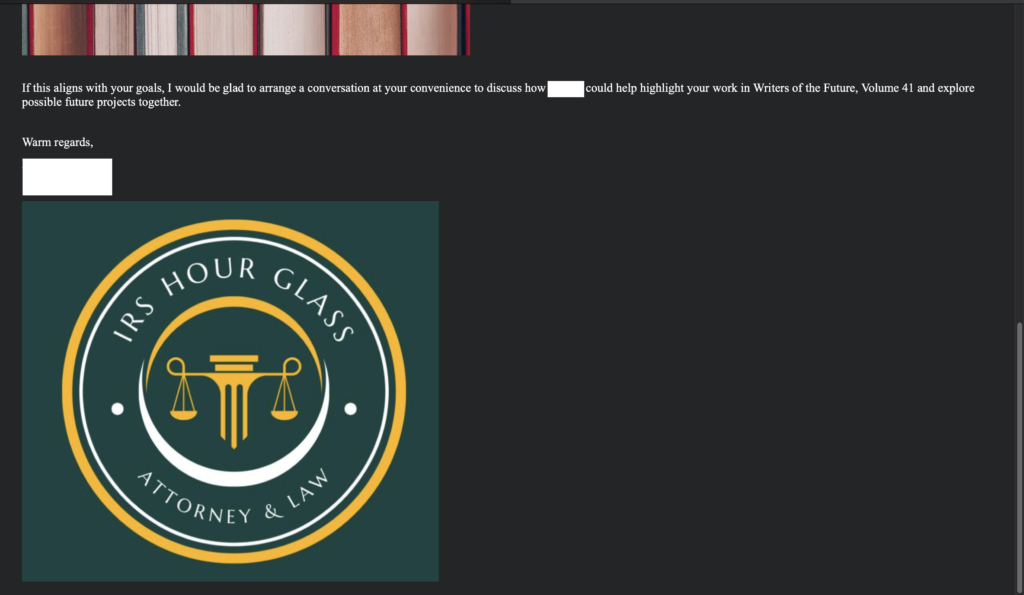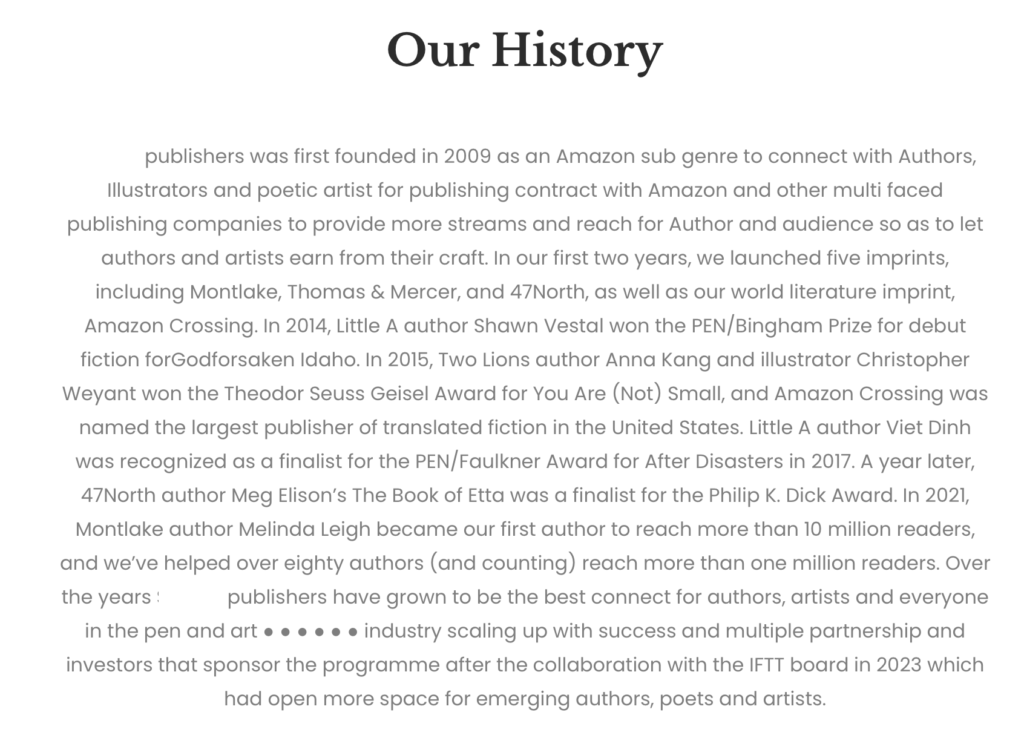One of the things that surprised me after my story was published in Writers of the Future, was how quickly I was targeted by marketing scams. And, even in the few months I’ve been getting such emails, they are getting increasingly sophisticated. I just wanted to use this blog post to flag this as a warning to anyone else who has received similar messages.
TLDR
Marketing scams are on the rise and appear to be targeting writers. Scammers are also using AI to try and add layers of authenticity to their emails. If you receive an email out of the blue, ask yourself is it a scam? Scrutinise it and consider why they would be sending you unsolicited emails.
If you’re a writer, I’d also recommend you subscribe to Writer Beware, a SFWA sponsored blog and a great resource.
Scammers, scammers, everywhere
After finding out I was a winner of the Writers of the Contest, I went about creating a website to try and get an online presence for me and my stories. Part of this was my new found determination to make a real go of becoming a writer and to treat it as a job and be all professional about it. I made this website and listed an email address so people could contact me. Naively, I thought this would just be people with a genuine interest in my stories. Oh, sweet summer child, how wrong you were.
Prior to April 2025 (when WOTF41 was published), I didn’t receive any emails from would-be scammers. However, not long after publication, I started getting emails from random people using gmail accounts that “wanted to help me boost visibility to my book” and other book services an author may require. All were completely unsolicited and nowhere (either on my website or social media accounts) did I ask for, or suggest I was looking for, anyone to provide such services.
In the last month, the number of these emails has increased and I’m now receiving at least two to three a week, if not more. I am an unknown writer with few publishing credits, so I can only imagine the barrage of emails established and much more successful authors receive.
Rate-a-scammer
To give you an idea of what these emails look like, I’ve included a few examples, ranging from the very poor to the potentially credible, along with some of the red flags that gave them away. I have deleted the names used in the email addresses due to the remote chance these were genuine emails (I would bet my mortgage they are not).
Example 1: Scammer rating – 3/10
This is the first email I received.

I thought it was odd that a marketer / marketing company would use a private gmail address, rather than a company email, to contact prospective new clients. Nonetheless, being very polite and also not wanting to come across as obnoxious to anyone that was sincerely looking to help me, I replied and said “thank you very much but the publisher is handling all the marketing”.
Not to be deterred, they kept replying and asking for more information about who to contact at the publisher and so on. I referred them to the publisher’s website but they wanted specific email addresses. Naturally, I did not provide this information and did not respond further.
Red flag(s): personal gmail account; no link to marketer’s website; zero online presence; unwillingness to directly contact the publisher and wanting specific email addresses rather than going via publisher’s website.
Example 2: Scammer rating – 1/10
This next example is the second email I received, about a week after the first, which put to bed any doubts I had about whether the first email was genuine. It is a blatant scam attempt and I deleted it without response.

Red flag(s): personal gmail account; poor English; random subject heading for email; absolutely no reference to what it is I do. I could go on.
Example 3: Scammer rating – 8/10
The next example was more credible, in that it appeared to be someone who might have actually read my story.

Luckily for me, about a day or two before receiving this email, I had read a blog by Writer Beware (see below), and this email was very similar to scam emails and the approach of scammers, who use AI to generate sincere and well-meaning (and emails with correct punctuation and grammar–terrible English is usually a giveaway).
This is an email that could make someone—especially someone unaware of the rise of these kind of emails—stop and engage and, potentially, fall foul of these scammers.
Red flag(s): private gmail account; no link to company / marketer’s website; zero online presence.
Example 4: Scammer rating – 7/10
This last one is perhaps the most sophisticated, but only upon a first glance. When I started looking more closely, the cracks in their authenticity were glaring.

The email came from what purported to be a publishing company with an actual company email address. I continued scrolling and then came to the signature…I laughed.

Why on earth would a publisher use a logo that names them as “Attorney & law” (this should be attorney at law), and what is an “IRS hour glass”? Some kind of arbitrary device the US tax office use to count down before commencing an investigation?
I decided to do a bit of digging, seeing as this email had gone to greater lengths than others to appear legitimate. I googled the company in question and they did in fact have a website and the person signing off the email appeared on that website (with a clear stock image as their photo). I snooped around their website and it was immediately very clear that it was stuffed with AI-generated nonsense and gibberish, another giveaway this was not a legitimate company. See their ‘history’ for example:

Apparently, the company in question was founded as an Amazon “sub genre”, whatever that is, and counts “47North” as one of its imprints. I am aware of 47North (it is a sci-fi and fantasy publisher), so that came as a surprise (please note the sarcasm). Whoever had asked whatever AI-LLM to generate this content just regurgitated information about another, genuine, publisher; all of the imprints listed there, as well as the authors (who are real and have won the awards noted), are imprints of Amazon Publishing.
While a closer scrutiny rendered this clearly a scam attempt, I was quite amazed at how far someone would go to generate this website to add a veneer of authenticity.
Red flag(s): AI-generated logo with no relevance to the company; why would a publisher be contacting me to help me advertise a book published by another publisher?; general platitudes meant to flatter my ego (“while some of your work has received broader recognition”, sadly, it has not!); clearly AI-generated gibberish content on their website.
Writers, subscribe to ‘Writer Beware’
The Science Fiction and Fantasy Writers Association (SFWA) sponsor a blog called “Writer Beware”, which is a great resource for writers. It tackles all kinds of things that writers need to be aware of, from unfair contract terms, copyright infringement and registration issues, and so on. If any writer has not yet subscribed, then I recommend that they do so right away.
As it happens, one of the first posts I received concerned the very same kind of emails I had been receiving. The blog post is here: Return of the Nigerian Prince: A New Twist on Book Marketing Scams. Even if you are not a writer, it makes for an increasing read about how sophisticated scammers are and I’m sure that the tactics used to try and defraud writers will be the same or similar in other areas too.
What I’ve learned
Even if you have the barest of online presences, someone out there will be looking to scam you. That makes me kind of sad to think about, but that’s the way it goes, I guess. Therefore, if you receive an email out of the blue, ask yourself: ‘is this legitimate?’ Scrutinise it and consider why someone would be sending you unsolicited emails.
As a result of the steady stream of scam emails (nearly 20 in two months), I have now removed my email address from my website and instead inserted a “Contact me” form. It remains to be seen whether scammers will go that extra step to contact me, and only time will tell. Either way, I will be deleting any of these sorts of emails without responding.
FYI: I have not fallen for any of these scams, in case you were wondering.